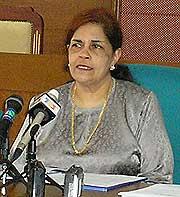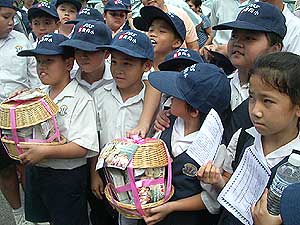Malaysia's reservations over eight areas in the Convention on the Rights of the Child (CRC) are not insurmountable and can be resolved, said the Human Rights Commission of Malaysia (Suhakam) today.
Although Malaysia had agreed to the CRC ten years ago, an impasse had soon developed over what the government viewed as sticky points in the Convention. Contention lay particularly in CRC's provisions pertaining to the definition of a child, the right to name and identity, freedom of expression, association, thought, conscience, religion, and access to education.
 Other articles to which Malaysia had objected related to CRC's provisions on non-discrimination and torture and the deprivation of liberty.
Other articles to which Malaysia had objected related to CRC's provisions on non-discrimination and torture and the deprivation of liberty.
Following a roundtable discussion on the CRC on Jan 19 and 20 last year and consultation with numerous stakeholders since, Suhakam believes its recommendations for all the objections to be withdrawn can now be seriously considered.
"There was also a recent meeting in September this year, a smaller roundtable, purely to address the eight reservations that we, the government of Malaysia, still maintains," said Suhakam commissioner Dr Raj Abdul Karim.
"In general, I'd like to tell you that the feeling of this roundtable was that almost all of the eight reservations can be withdrawn," she told reporters at the launch of Suhakam's Report on the Roundtable Discussion on the CRC.
Marginalised kids
Some of the eight provisions were seen to clash with the government's position, such as those relating to identity and nationality, non-discrimination, freedom of conscience, expression, and religion.
The other CRC provisions, said Raj, were seen as conflicting with either state laws, such as those pertaining to the Syariah.
A report addressing specifically the eight reservations to the CRC would be released sometime in 2006, said Raj, adding recommendations were made during the roundtable towards fuller implementation of the CRC and its Optional Protocols into the country's Child Act 2001 and other domestic laws.
 Among the issues raised included the protection of marginalised children, such as those living with HIV/Aids, the poor, the disabled, documented and undocumented migrants, and indigenous children and orphans.
Among the issues raised included the protection of marginalised children, such as those living with HIV/Aids, the poor, the disabled, documented and undocumented migrants, and indigenous children and orphans.
Access to and quality of basic amenities such as water, education and holistic medical benefits also need to be improved, said Raj, as there are many children deprived of these either because of poverty, lack of documentation, or other conditions.
Other children, meanwhile, have been shortchanged because of the narrowing of medical treatment to merely "physical ailments," said Raj. "We also have to pay attention to mental and emotional health," she said.
The authorities also seem to have forgotten the special needs of adolescents as a group distinct from other children, said Raj, citing the example of hospitals that lump those above 12 years in wards for adults.
Marriage age
The country's courts and legal system, on the other hand, need to be improved to accommodate the needs of children whether as parties or witnesses to judicial proceedings as well as to clear the backlog of cases.
When children are detained, bails, for example, are sometimes too high for their parents to pay, leading to the prolonged detention of children who are under remand. The Syariah courts, on the other hand, need to be reformed in view of perceptions that they have been unfair and lack professionalism, said Raj.
In this regard, the issue of definition of age also was raised pertaining to the allowable age for marriage. "Some states have the age at 16. This needs to be re-looked at," she said.
Raj said Suhakam recommended that the media improve its role in being more pro-active and responsible in protecting the interests and welfare of children.
The Report on the Roundtable Discussion on the CRC would be forwarded to various government agencies, most notably the Attorney-General's Chambers and the Ministry of Women, Family and Community Development as well as non-governmental agencies.
It would also feed into the second National Plan of Action for Children following the launch of the first plan in 2001, she said.

